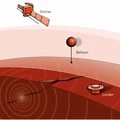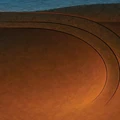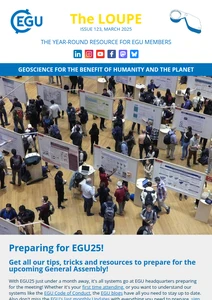President: Laetitia Le Pourhiet
(Emailgd@egu.eu)
Deputy President: vacant
ECS Representative: Garima Shukla
(Emailecs-gd@egu.eu)
Studies related to the Geodynamics Division include all aspects of geodynamic processes in the lithosphere, mantle, and core. They encompass different approaches, including observations, imaging, theory, modelling (numerical simulations and laboratory experiments), and interpretation. Examples include the dynamics of subduction, mid-ocean-ridge processes, vertical and horizontal plate movements driving mountain building and basin formation, lithosphere dynamics, mantle convection, and core dynamics.
Latest posts from the GD blog

Balancing pregnancy, family, and a scientific career: a look at the challenges faced by women in STEAM
In this week’s blog post, Dr. Katherine Villavicencio (University of Pisa) explores how women in STEAM navigate pregnancy and family life while advancing in their careers and examines the support (or lack thereof) provided by academic and research institutions. Science, Technology, Engineering, Arts, and Mathematics (STEAM) careers are undoubtedly demanding. For women in these fields, juggling the rigorous requirements of academia and research becomes even more complex when layered with pregnancy and caregiving responsibilities. While reseach can be exhilarating, it …
Read more

Iris van Zelst – GD Outstanding ECS Award 2025
The 2025 Outstanding Early Career Scientist Award of the Geodynamics Division was awarded to Iris van Zelst in recognition of her outstanding ability to connect research fields including earthquake dynamics, planetary sciences and geodynamics, along with her profound engagement with science outreach and promotion of diverse and inclusive working enviroments. In this interview, Iris -also former EGU GD blog editor and very well-known figure in the blog- talks about her academic journey and her thoughts of the future holding for …
Read more
Notice! – Your public data has been collected to study the diversity of the geodynamics community over time
Dear Geodynamics community, This is your trusted former Editor-in-Chief speaking. I have an important announcement! In very exciting news, the team behind the 101 Geodynamic modelling paper (which I am sure you have read and loved, right? No? Well, what are you waiting for?! Check it out here!) has reunited to write another very relevant paper tailored to the geodynamics community. You’re welcome. We know you’ve been waiting for it. This time, we thought we’d dive into Equality, Diversity, and …
Read more

Neil Ribe – Augustus Love Medallist 2025
The 2025 Augustus Love Medal of the Geodynamics Division was awarded to Neil Ribe in recognition of his outstanding and fundamental contributions to a wide range of problems in geodynamics using rigorous mathematical approaches. In this interview, he talks about his research and how he got involved in geodynamics, while also sharing his thoughts on what the future might hold for the discipline. Neil Ribe’s Augustus Love Medal Lecture will take place on Tuesday 29 Apr at the EGU General …
Read more
Recent awardees

The 2025 Augustus Love Medal is awarded to
Neil M. Ribe for outstanding and fundamental contributions to a wide range of geodynamical problems using rigorous mathematical approaches.
Read more

- 2025
- Division Outstanding Early Career Scientist Award
The 2025 Division Outstanding Early Career Scientist Award is awarded to
Iris van Zelst for a profound impact on the geodynamics community through outstanding scientific contributions, inspiring leadership, enthusiastic outreach, and fostering an inclusive and diverse work environment.
Read more

The 2024 Augustus Love Medal is awarded to
Taras Gerya for his novel approach in using computational geodynamics to address outstanding tectonic and geodynamic questions in a way that reaches out to petrologists, geochemists, and structural geologists.
Read more

- 2024
- Division Outstanding Early Career Scientist Award
The 2024 Division Outstanding Early Career Scientist Award is awarded to
Anne Glerum for her contributions in geodynamics, including providing new insight in the East African rift system, methodological advancement of geodynamic modelling techniques, and outstanding community service.
Read more

- 2024
- Outstanding Student and PhD candidate Presentation (OSPP) Award
The 2024 Outstanding Student and PhD candidate Presentation (OSPP) Award is awarded to
Jorge Sanhueza Slab window geodynamics: towards an integrated understanding of upper mantle dynamics and observations
Read more
Current issue of the EGU newsletter
In our March issue we are here to help you prepare for the EGU25 General Assembly, with guides for first time attendees, understanding the EGU Code of Conduct, our playlist of EGU25 walk-through videos, two webinars to help you prepare your presentations and sign ups open for the EGUtoday newsletter, we are excited to get together with you all, in Vienna and online, in less than a month!
This month we also learned about a special scientific landscape under threat and what we can do to help, and now is also your last chance to get involved in the Science for Policy interface in Europe by applying to join EGU's new Climate Hazard and Risk Task Force by 31 March.
For all our talented photographers, the EGU Photo Competition is still open for submissions; enter by 31 March and you could win free registration to EGU26, and the admiration of your peers! All this and much more in this month's Loupe!
Read more









